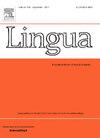德语和冰岛语中同义的 Dat-Nom/Nom-Dat 动词的主语和参数结构
IF 1.3
3区 文学
0 LANGUAGE & LINGUISTICS
引用次数: 0
摘要
本文研究了最近在文献中分析过的一组 15 个同时许可名词性和助动词性参数的冰岛动词,并将它们与相应的一组 15 个德语动词进行了比较。冰岛语数据集包括三种不同参数结构的动词:(a) 普通Nom-Dat动词,(b) 非交替Dat-Nom动词和(c) 交替Dat-Nom/Nom-Dat动词。德语数据集包含冰岛动词的(近)同义词或同源词。我们最重要的发现之一是,德语中表面上的 Dat-Nom 动词,如 gefallen "请,喜欢",实际上是该语言中的 Dat-Nom/Nom-Dat 交替动词。也就是说,这些动词既可以实例化 Dat-Nom 也可以实例化 Nom-Dat 论据结构。这一结论得到了词序统计的支持,词序统计显示,在德语和冰岛语中,Dat-Nom/Nom-Dat 交替动词和普通 Nom-Dat 动词之间存在很大差异。我们还使用条件推理树对两种语言的交替动词集进行了统计研究。冰岛语和德语之间的差异在涉及代词的配置中表现得尤为明显,而对于双重 NP,我们发现了与单语(冰岛语)数据集相同的额外因素,即动画性、长度和(不)确定性。本文章由计算机程序翻译,如有差异,请以英文原文为准。
Subjecthood and argument structure of synonymous Dat-Nom/Nom-Dat verbs across German and Icelandic
This paper investigates a set of 15 Icelandic verbs licensing both a nominative and a dative argument, recently analysed in the literature, comparing them with a corresponding set of 15 German verbs. The Icelandic dataset consists of verbs selecting for three different argument structures: (a) ordinary Nom-Dat verbs, (b) non-alternating Dat-Nom verbs and (c) alternating Dat-Nom/Nom-Dat verbs. The German dataset contains either (near-)synonyms or cognates to the Icelandic verbs. One of our most important findings is that apparent Dat-Nom verbs in German, like gefallen ‘please, like’, are in fact alternating Dat-Nom/Nom-Dat verbs in that language. That is, these verbs can either instantiate the Dat-Nom or the Nom-Dat argument structure. This conclusion is supported by word order counts, which show a major difference between alternating Dat-Nom/Nom-Dat verbs and ordinary Nom-Dat verbs across both German and Icelandic. We also examine the set of alternating verbs across both languages statistically using a conditional inference tree. The differences between Icelandic and German especially play out in configurations involving pronouns, whereas, for double NPs, we identify the same additional factors as have already been identified for the monolingual (Icelandic) dataset, namely animacy, length and (in)definiteness.
求助全文
通过发布文献求助,成功后即可免费获取论文全文。
去求助
来源期刊

Lingua
Multiple-
CiteScore
2.50
自引率
9.10%
发文量
93
审稿时长
24 weeks
期刊介绍:
Lingua publishes papers of any length, if justified, as well as review articles surveying developments in the various fields of linguistics, and occasional discussions. A considerable number of pages in each issue are devoted to critical book reviews. Lingua also publishes Lingua Franca articles consisting of provocative exchanges expressing strong opinions on central topics in linguistics; The Decade In articles which are educational articles offering the nonspecialist linguist an overview of a given area of study; and Taking up the Gauntlet special issues composed of a set number of papers examining one set of data and exploring whose theory offers the most insight with a minimal set of assumptions and a maximum of arguments.
 求助内容:
求助内容: 应助结果提醒方式:
应助结果提醒方式:


